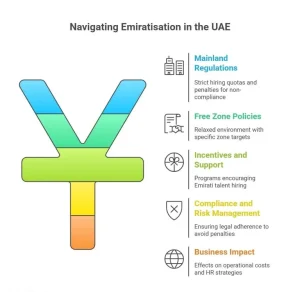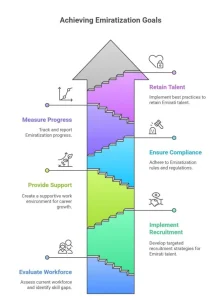Emiratisation is a UAE regulation policy imposed on public and private industries to provide employment opportunities for the local citizens in the Emirates. This policy impacts all businesses in the mainland and free zones. However, free zones offer smoother and relaxed policies for business ventures and companies than the mainland in the UAE.
Businesses must understand the Emiratisation UAE guidelines for the specific free zone to avoid inconvenience. However, free zones offer easier policies but specify their particular targets for hiring Emiratis in their companies. Some free zones offer more incentives and support programs encouraging companies to hire Emirati talent.
Companies must ensure legal compliance for additional benefits and initiatives from the Emiratisation in Free Zones. They must review the policy updates from the free zone authorities to ensure complaints and avoid potential risks of penalties.
Explore this blog to learn more about what Emiratisation is, its impact, and requirements in UAE for businesses.
Free Zone vs. Mainland: Understanding Emiratization Rules
Emiratization, while a cornerstone of UAE economic policy, differs significantly between mainland and free zone businesses.
These businesses must actively recruit and develop Emirati talent to meet government targets.
The UAE government imposed strict regulations for Mainland companies to extend the hiring quotas for Emirati employees according to the company type, size, and workforce. Businesses that fail to fulfill the regulatory requirements can face consequences, legal obligations, and hefty fines. They need to hire Emiratis actively and extend their quotas to meet UAE government criteria and earn financial incentives.
Emiratization in Free zones typically offers a more relaxed environment. While some free zones might have their own incentives or targets to encourage Emirati employment, the overall requirements are less stringent than the mainland. However, free zone businesses must understand the specific rules of their respective zone to ensure compliance and potentially benefit from available support programs.
Understanding these differences is essential for businesses choosing between a mainland or free zone setup, as Emiratization in Free Zones can significantly impact operational costs and human resources strategies.

What is Emiratisation & how will it impact businesses?
Emiratization is a UAE government initiative introduced to increase the employment opportunities for Emirati citizens in both the public and private sectors. The Emiratisation law policy is designed to reduce reliance on foreign labor and foster economic diversification.
Businesses in the UAE are significantly impacted by Emiratization. Companies are required to meet specific quotas for Emirati employees, which can vary based on company size and industry. Failure to comply with these quotas can result in financial penalties.
To meet Emiratization targets, companies may need to restructure their workforce, invest in training and development programs for Emirati employees, and explore recruitment strategies to attract local talent. While Emiratization can be challenging, it also presents opportunities for companies to obtain a skilled local workforce and contribute to the nation’s development.
Developing Effective Emiratisation Strategies for Business
It’s essential to develop efficient strategies to implement Emiratization in Free Zones for smooth business operations and legal compliance. An efficient strategy requires a comprehensive approach for businesses so they can create a diverse workforce and contribute to economic growth and success. These are the essential steps to develop effective strategies for businesses.
Companies need to evaluate the current workforce reliability and identify the roles and positions for Emirati talent to fill skill gaps. They must analyze to determine the skill development training and hiring of new Emirati talent.
Businesses need to implement targeted recruitment initiatives for the Emirati workforce. They can consider partnerships with training centers and educational institutions to acquire top Emirati talent.
It’s essential to provide a secure and supportive work environment to promote career growth and development for the Emirati workforce. They can provide professional development opportunities and training to enhance their skill level.
Companies must ensure legal adherence to Emiratisation rules and regulations to enjoy the benefits of UAE government incentives and financial support.
Companies can check their strategic planning and policies using performance indicators and take efficient actions to update them accordingly.
Talent Acquisition and Development for Emiratization
Successful Emiratization depends on effective planning and development for the Emirati talent hunt. They need to attract and retain local citizens with effective policies, planning, and development opportunities. This approach includes specific hiring campaigns, considering educational institutions and training centers to acquire the best local talent. However, employer brand marketing is essential to extend the company’s position in the competitive job market in the UAE.
Once hired, comprehensive development programs are essential. This includes on-the-job training, mentorship, and leadership development initiatives. Creating easy career paths and opportunities for development motivates Emirati employees.
Moreover, promoting a supportive and secure work environment is vital for employee satisfaction and retention. By prioritizing talent acquisition and development, businesses can build a high-performing Emirati workforce and contribute to the nation’s economic growth.

Performance Management and Career Progression
Effective performance management is essential for the successful implementation. It provides an efficient framework to assess Emirati employees’ contributions and identify strengths and areas for improvement. Regular performance reviews offer opportunities to provide constructive feedback, set clear expectations, and recognize achievements.
Moreover, linking performance management to career progression is crucial for employee motivation and retention. By establishing clear career paths, organizations demonstrate commitment to Emirati talent development. High-performing employees should be rewarded with promotions, increased responsibilities, and opportunities for skill enhancement. This approach not only helps to increase employee morale but also ensures a talent pipeline for future leadership roles.
Ultimately, a well-executed performance management and career progression system fosters a high-performance culture, where Emirati employees feel valued, challenged, and committed to the organization’s success.
Measuring and Reporting Emiratization Progress
Tracking and reporting Emiratization progress is crucial for legal compliance and identifying requirements for improvement for companies. They need to establish key performance indicators to measure Emiratization rates, employee turnover, and training completion. However, regular management reports and relevant government authorities ensure transparency and compliance.
Data analysis is essential to identify trends, challenges, and successes. Organizations can fine-tune their Emiratization strategies by analyzing performance metrics. Effective reporting also highlights the positive impact of Emiratization initiatives on the business, such as increased productivity, innovation, and customer satisfaction.
Emiratization: Rising Challenges and Opportunities
Emiratization presents critical challenges and opportunities. The most crucial challenges include searching for and attracting top-tier Emirati talent and retaining skilled employees in a competitive job market. It’s essential to match their expertise and skills with the required industry trends and business objectives.
However, they can also offer various business opportunities to obtain an energetic and motivated workforce. This approach will enhance corporate responsibilities for government initiatives and financial support. Companies can face the rising challenges and avail of government incentives by successfully implementing Emiratization rules and effective strategies.
Government Initiatives to Support Emiratization
The UAE government has offered various initiatives to support the Emiratization program. These incentives include financial support for organizations for hiring Emiratis and offering them skill training programs to develop skills and enhanced services.
The UAE government established clear Emiratization rules for the public and private sectors, creating a well-defined framework for businesses. These initiatives create a bridge to remove the gap between Emiratis and companies for available opportunities.
Best Practices for Business to Emirati Talent Retention
The best practices for businesses to retain Emirati talent require efficient planning and a smart approach. Companies can provide attractive salary packages and additional benefits for career development opportunities and training according to their requirements. This effective strategy can promote a positive company culture, and it helps to balance employees’ work-life.
They can offer skill training and support for potential growth, offer opportunities for decision-making procedures, and appreciate their contribution. Companies must provide a supportive and engaging work atmosphere to enhance their workforce loyalty and satisfaction.
FAQs
Is Emiratization applicable to free zone companies?
Emiratization applies to companies in free zones with certain conditions according to their allotted quota from the government.
What are the new rules for Emiratization?
The new Emiratization rules extend the quota of hiring the Emirati workforce according to the size and type of company.
How is Emiratization calculated in the UAE?
Emiratization can be calculated in the UAE according to the total workforce, which is related to the total number of Emiratis in the company. It depends on the size and number of total employees in the company.



